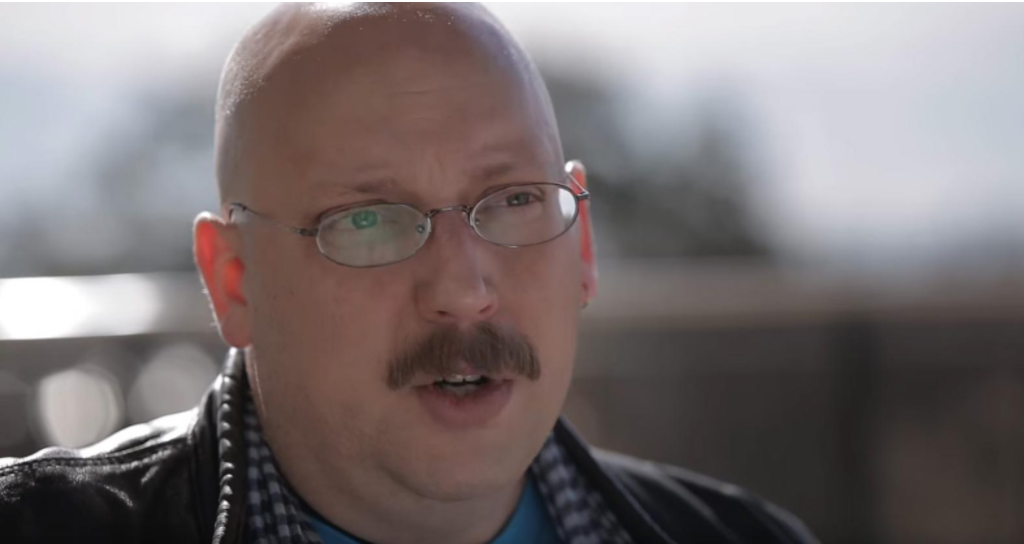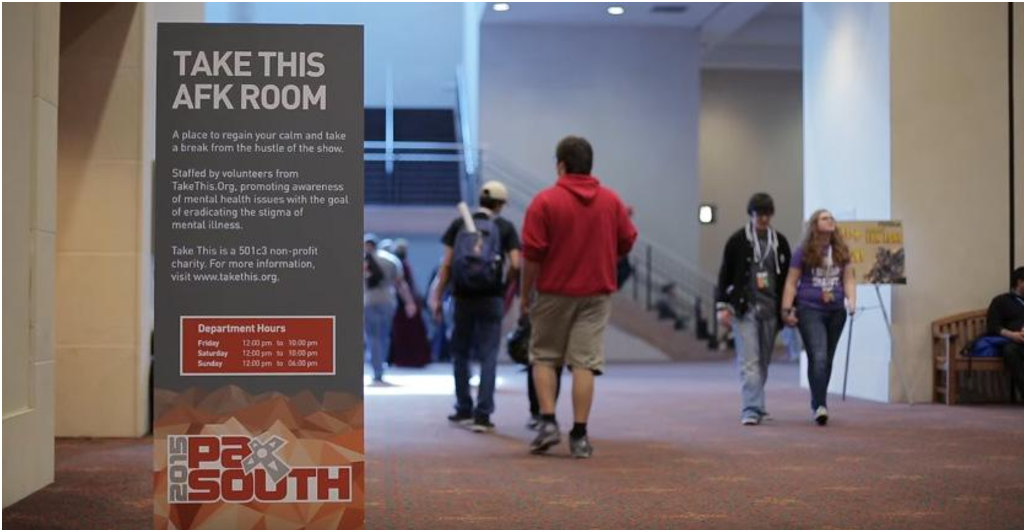This article is part of Waypoint’s “Mental Health Bar” series. Find previous pieces here.
“Everyone understands a broken leg, right? If you see someone on the sidewalk and their leg is at an awkward angle, you’re like, ‘Oh, yeah, that’s a broken leg,’ and you know what to do. It’s less automatic to know what to do or to even recognize that someone is dealing with a mental health issue. I’m hoping that we can make a dent in that.”
Videos by VICE
The analogy Take This co-founder Russ Pitts poses is simple, but strikes right at the heart of the issue. Talk about mental health is taboo in modern popular culture, which, in the western world at least, perpetuates a warped “suffer in silence” rhetoric—one which suggests facing up to mental health issues is somehow admitting defeat.
This of course couldn’t be further from the truth—something neatly echoed by the charity’s mission statement: “to inform our community about mental health issues, to provide education about mental disorders and mental illness prevention, and to reduce the stigma of mental illness.”
Take This was founded in late 2012 by games editors Russ Pitts and Susan Arendt after the sudden death of a colleague. Earlier that year, Matt Hughes—a talented freelance writer who had worked under both Pitts and Arendt and who’d begun carving out an impressive writing portfolio—took his own life.
Unbeknownst to his employers, he’d suffered from depression and, as Kotaku reported at the time, sent an email to his editors in the October of that year, stating he would no longer be available for work. “The first anyone had heard of this person’s struggle was when we found out he was dead,” recalls Pitts. “It was such a huge shock.”

Russ Pitts. All photography courtesy of Take This
Pitts and Arendt realized that while they both had close working and personal relationships with a number of folks in the industry, much of their interactions and conversations took place in the relatively isolating online spectrum. They recognized that any one of their peers could be going through the same as Matt, without them knowing. They asked themselves what they would do if they found out someone they worked with closely suffered from depression, and what they would want to tell them. The answer was simple: “you’re not alone.”
Take This’ raison d’être quickly became raising the profile of mental health discussion in the games industry. It enlisted the help of Mark Kline—a practicing clinical psychologist who taught himself how to play World of Warcraft in order to better relate to his younger clients, before becoming addicted to the sprawling fantasy MMO himself—who grounded Pitts and Arendt’s directed advocacy in clinical research. This input would prove invaluable as it allowed the charity to interface with not just the games industry but also the clinical world.
“Earlier this year I was in Virginia for a mental health conference and for 45 minutes it was just me showing them video games that existed that touched on mental health issues,” says Pitts. “Their jaws were dropped the entire time, as they had no idea. I had person after person come up to me afterwards and tell me they had no idea that games were about more than just shooting people. With the explosion of indie studios in the last few years, there are more ways people are finding to communicate ideas through video games. The possibilities to address mental health issues through video games are endless and amazing. It’s been really nice to introduce that to folks.”
The possibilities to address mental health issues through video games are endless and amazing. – Russ Pitts
Games like Actual Sunlight, Depression Quest and Deep are good go-to examples of how video games can facilitate conversations in and around mental health. Take This’ co-executive director Shannon Gerritzen suggests games are often thought of as crude playthings centered around violence, yet wider preconceptions are beginning to shift.
“Video games tend to get vilified, and where we’ve helped that conversation is by bringing to light those types of games,” she says. “Video games aren’t just shooters and so, when we’re having that conversation and taking it to a bigger audience, we’re able to show that. We can prove that these are games that help people as well, these are an outlet, a hobby and a lifestyle, and that’s okay.”
Flagship initiatives such as the charity’s AFK Rooms and Underground Consulting Program have seen Take This grow its volunteer corps close to 300 researchers and psychologists. Pitts acknowledges the wealth of information and feel-good articles that feature elsewhere online and suggests Take This adds clinical research and factual evidence to the discussion. Everything is rooted in scientific application, and, as the charity operates in web media, its information is then packaged and relayed in a way that’s easily digestible.
What began with the simple desire of populating a website with stories from like minded people—something TakeThis.org still does today—quickly spawned the aforementioned programs. The AFK Program, for example, began in 2014 and works directly with conventions such as PAX to create safe spaces for attendees. It works alongside convention staff and helps guide shows to becoming friendlier to people with mental health issues, while also helping to alleviate the stress of hosting such big productions.
“That was such a successful and needed program that it really grabbed Take This and sort of pulled it into the next year,” says Pitts. “The program became a bit of a monster in that it took over everything we did.” Moving forward, Pitts notes his desire to make the AFK Program more readily available to smaller-sized shows.

The AFK room at PAX South. Photo courtesy of Take This
As a four-year-old non-profit organization that started out with modest expectations, much of said moving forward has been spent “building backwards” says Pitts. “Now that we have that, the future is to grow everything,” he adds, which is where projects like the Underground Consulting Program come in.
Depression-proofing studio culture is something Pitts takes seriously and is a subject he’s lectured on at the Game Developers Conference on numerous occasions. His feedback his been consistently positive, so he’s extended the opportunity into brick and mortar studios. This has seen Take This working alongside management consultants and a workplace organizational-industrial psychology expert who has worked with the likes of NASA.
Ultimately, the program seeks to converse with people in the workplace, examine the issues, and work together with staff and directors to find solutions. It addresses the issue of “crunching”, where devs work long hours of unpaid overtime, and has even led to the publication of a white paper for the International Game Developers Association (IGDA).
“We have thrown an overwhelming [amount of] science at this idea that workspaces can both contribute to mental health issues and also alleviate them,” explains Pitts. “We’ve been working with client studios to develop the program, and we’re ready to introduce it to the industry at large.”
I think we’re turning a corner as a society as a whole, where issues of mental health are not a deep dark family secret anymore, and never should have been. – Shannon Gerritzen
So how have these projects been received? While Pitts suggests many psychologists had little to no awareness about the video game community at all in the past, much less any experience with video games, Take This’ enduring efforts to bridge the gap between the two communities appear to have made a significant difference.
Development studios, on the other hand, often suffer a disconnect between front line devs and studio leaders—which is something Take This constantly strives to mend. “Either [studio leads] are not aware of how severe the issue is,” adds Pitts, “or their perspective of studio leadership means that even if they are aware and sensitive to it and care about tackling it, they’re not sure how.”
Take This aims to take up the slack whenever it can and highlights the industry’s relative youth and constant reinvention as core culprits. On a micro level, Pitts also points to the statistical fact that the games industry attracts people who are more susceptible to mental health issues and that a lot of the conditions its employees work under exacerbate those issues. He is confident that Take This can help bring these statistics down, as is Gerritzen.
“I think we’re turning a corner as a society as a whole, where issues of mental health are not a deep dark family secret anymore, and never should have been,” she says. “But, for whatever reason, that’s where we are, it’s been an uphill battle to make people realize: it’s okay. If you’re coming from a place where no one talked about it, how do you become the first person to talk about to break that silence?”
Related: The Curious Appeal of Crunch
In just four years, Pitts can’t quite believe the impact the charity has had and continues to have. Better still, it shows little sign of slowing down.
“To lean on the analogy of the broken leg again: nobody would sit at home with a broken leg and not go and seek help,” Gerritzen adds. “It’s so curious to me that if my tooth hurts I’m not going to sit here for years on end with a toothache. I’m gonna go to a dentist, and that’s acceptable. It should be acceptable, too, that if I’m having a dark day and it doesn’t end, that I go seek help for that.”
Follow Joe on Twitter. Find more information about Take This at the charity’s official website.




